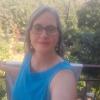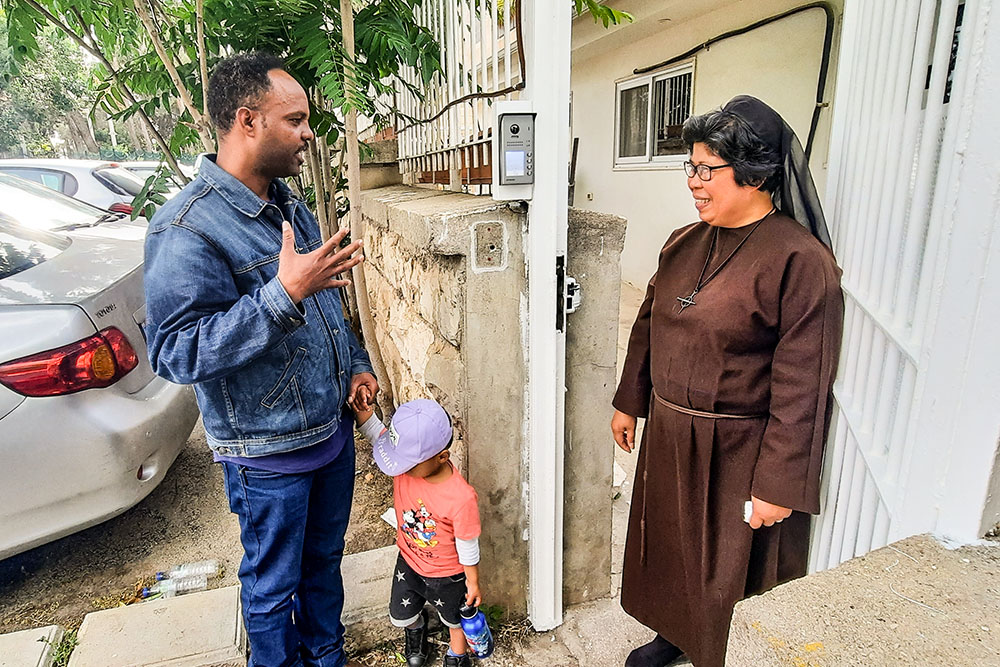
Franciscan Sister of the Eucharist Sr. Maria David Magbanua speaks with Abraham Rada as he comes to pick up his 2-year-old son Yonatan from the St. Rachel Center day care in Jerusalem after a day of work at a nearby minimarket. Rada, who arrived in Israel as a refugee from Eritrea in 2008, says the nuns at St. Rachel take care of Yonatan "like family." (Judith Sudilovsky)
Editor's note: Global Sisters Report's new series, "Welcoming the Stranger," takes a closer look at women religious working with immigrants and migrants. While we cover this topic often, this series will feature sisters and organizations networking to better serve those crossing borders, global migration trends and the topic of immigration in the upcoming U.S. presidential election.
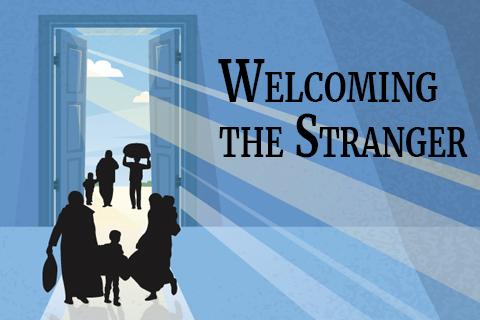
Every day after his work shift at a nearby mini-market, Abraham Rada rides his motorized bike over to the Capuchin brothers' monastery on a quiet street in downtown Jerusalem to pick up his 2-year-old son, Yonatan, from the St. Rachel Center day care.
Managed by Franciscan Sister of the Eucharist Sr. Maria David Magbanua under the auspices of the Latin Patriarchate's Vicariate for Refugees and Asylum Seekers, Rada — who arrived in Israel as a refugee from Eritrea in 2008 — says the church-sponsored child care center gives him and his wife peace of mind in their otherwise sometimes unsettled lives.
"This is the only place for me," said Rada.
Some 64,000 African asylum seekers escaping brutal dictatorships and genocides began arriving in Israel through the Sinai desert almost two decades ago, according to the Israeli immigration authorities.
Like most of them, Rada has still not received official status as an asylum seeker.
The asylum seekers are tenuously permitted to remain in Israel but with no legal status, where Israel recognizes it cannot deport them, but on the other hand denies them economic and social rights, such as social security benefits, state health insurance and most social services.
'I have everything here for my son. The sisters take care of the children; it is like family. I have not seen this in other places,' says Eritrean refugee Abraham Rada.
At least, with his son at St. Rachel, Rada does not have to worry about the care his son receives while he and his wife are at work, he said.
"I have everything here for my son. The sisters take care of the children; it is like family. I have not seen this in other places," he said.
The concern for a safe care center for Rada's son can't be taken lightly. Seventeen children of asylum seekers died between 2010 and 2017 in crowded unregulated preschools, where sometimes up to 80 children were cared for in makeshift nurseries run by mostly untrained refugee or migrant mothers lacking in resources for proper care and supervision.
The deaths have created more awareness of this critical situation, especially in Tel Aviv. The Tel Aviv-Yafo municipality's Mesila municipal unit, which provides assistance and social services to asylum seekers and undocumented people, stepped in to provide more training for caregivers. But there has been little action on the part of the Israeli government in finding safe child care for the young children of refugees and migrant workers. As recently as January 2020, a baby died in one such unregulated day care center in South Tel Aviv.
Magbanua, who herself originally came to the Holy Land as a migrant worker from the Philippines before she heeded an inner calling to religious life, has been director of the St. Rachel Center for the past seven years. The center includes a day care facility that can accept 28 younger children, as well as an afterschool program for some 30 older children that is located on the premises of the Capuchin Monastery.
Migrants and asylum seekers, including single mothers, don't have an official status in the country, Magbanua said one hot Jerusalem afternoon while greeting parents with a broad smile as they picked up their children. Laughter and sounds of small children running drifted over from the protected outdoor playground where volunteers were amusing a few preschool-aged children with water games.
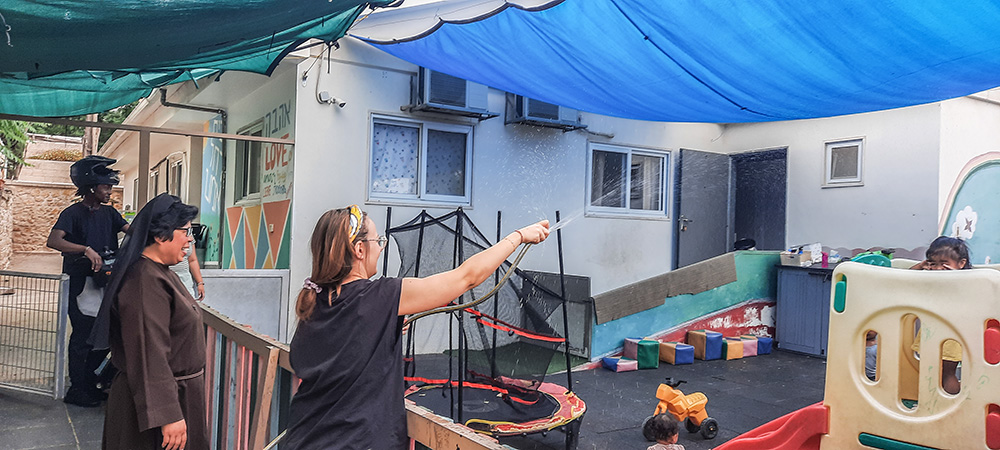
Sr. Maria David Magbanua looks on as a volunteer plays water games with the children at St. Rachel Center in Jerusalem on a hot summer afternoon. (Judith Sudilovsky)
African asylum seekers from Sudan and Eritrea receive a temporary and limited visa. They are regulated under a government policy of group protection against deportation, which recognizes the dangers they would face if they return to their countries of origin.
Israel is also home to thousands of migrant workers, mostly from the Philippines, who generally come to Israel to work as caretakers for the elderly, explained Magbanua. Some women workers overstay their work visas when, after giving birth, they remain in the country with their baby, which is against work visa regulations. While some mothers opt to send their babies back to their country of origin to be cared for by family members so they can continue legally working in Israel to send money back home, others decide to remain in Israel illegally with their children.
A situation report regarding children of refugees and asylum seekers released in October 2023 by Aid Organization for Refugees and Asylum Seekers in Israel noted that according to the Population and Immigration Authority, only about 24,000 refugees from Eritrea and Sudan, and approximately 8,200 of their children, remain in Israel as of June 2023. At least half of babies and toddlers of refugees and asylum seekers still attend unregulated nurseries staffed by untrained babysitters, the report said, even though Israel's State Comptroller warned over a decade ago of the dangers and dramatic consequences.
Once children reach the age of 5, they are integrated into the Israeli public school system as required by law, but finding affordable — and safe — child care for children younger than 5 is a problem for parents as they are not eligible for any of the subsidies available to low-income Israeli citizens.
The parents do not have enough money to pay for the official day care centers available for young children in Israel, explained Magbanua, and so the crowded "warehouses" of untrained babysitters for children began cropping up about a decade ago, especially in Tel Aviv.
In 2016, Jesuit Fr. David Neuhaus, at the time in charge of coordinating pastoral service for immigrants and asylum seekers in Israel as patriarchal vicar of the Hebrew-speaking Catholic community, established the St. Rachel Center in Jerusalem and a sister center in Tel Aviv through the Our Lady Women of Valor Parish to address these needs.
'They are always asking questions, coming into my office without knocking. My door is always open to them,' says Sr. Maria David Magbanua, smiling. 'All they need is a bit of attention.'
"For the church, it was a question of whether we can do something here in order to make sure that the children are safe and to help the mothers so that they can go to work knowing that their child is in safe hands," said Benedictine Sr. Gabriele Penka, administrator for the Vicariate for Migrants and Asylum Seekers who oversees both care centers. "Of course, it was not only the church who saw the need, but also Israeli organizations realized there was a need."
In Tel Aviv, the vicariate collaborates with Israeli Unitaf, a volunteer organization that works to improve early childhood education for status-less children. There is no such organization in Jerusalem and with no involvement from the Jerusalem municipality, St. Rachel is the only day care center in the city specifically for this vulnerable population, Penka said.
Magbanua noted that there is a long waiting list at St. Rachel because of limited space and a small staff, especially now in the midst of war, as six volunteers were called back to their home countries by their volunteer programs.
Two volunteers have returned to Jerusalem to continue their work as private individuals. In addition to Magbanua, staff at St. Rachel include an Italian Orsoline sister, a sister of the Jesus Brotherhood community in Germany, two Sisters of the Cross of Chavanod from India, two sisters of St. Joseph of the Apparition, and a member of the Focolare Movement.
In Tel Aviv, two sisters from Sri Lanka from the Our Lady of Perpetual Help congregation work from the Our Lady Women of Valor center — the main center for migrant workers and asylum seekers — and oversee a day care program for children of migrants and asylum seekers.
The children come from varied cultural backgrounds, including Eritrean, Ethiopian and Sudanese asylum seekers, and migrant families from the Philippines, India and Sri Lanka as well from French- and English-speaking Africa and Eastern Europe.
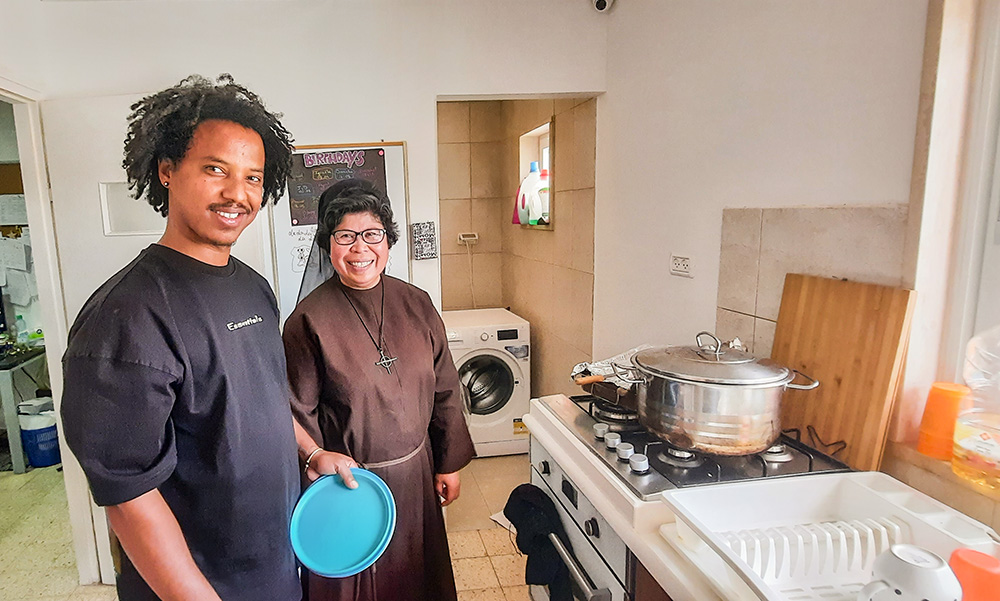
Sr. Maria David Magbanua and a volunteer who is a member of the Eritrean asylum-seeking community prepare lunch for children of St. Rachel Center day care. (Judith Sudilovsky)
St. Rachel serves children from families of all faiths Magbanua added, turning to attend to a question from a persistent young girl.
"They are always asking questions, coming into my office without knocking. My door is always open to them," Magbanua said, smiling. "All they need is a bit of attention."
Hebrew is the language that unites the children. Some of the older children are also aware of the precarious status their families have in Israel, so providing them with some sort of "safe haven" offers a modicum sense of stability, she said. In addition to normal teenage angst, these young people also struggle with their own sense of identity and belonging.
"It's very important that they meet and have their experience expressed in their mother tongue, which for the children really becomes Hebrew even if their own mother doesn't speak it," Magbanua said.
"They are not necessarily proud of being Filipinos because in a way [their parents] came here as cheap labor," noted Penka. "So they don't feel very connected to their origins, and they have never been to the Philippines. They feel Israeli because they were born here, and they know what is going on here, but others see them as Filipinos."
The center also works with the St. James Vicariate for Hebrew-speaking Catholics to help the youth build up their connection to their Catholic identity, Penka said.
"They are really a very tiny minority and totally living within the Jewish Israeli context. It is difficult for them to maintain the Catholic identity," she noted.
For many asylum seekers there is no option to return to their native countries. Despite the complexities and stress involved in remaining without a legal status, many migrants also opt to stay in Israel, where they are able to earn significantly more money.
For Melanie, a migrant worker who asked that her real name not be used, it is comforting to know that her 2-year-old daughter is looked after in a safe Christian environment and that her three teenage sons have a place to come to after school where they receive a warm lunch while she is working.
"This is a safe place for them. If my sons have homework, they can get help here," she said. "There is a connection with the church and everybody is helping, like a family."
Advertisement
St. Rachel also includes the Guardian Angel residence for teen boys who are having difficulties at home, which is coordinated by a member of the St. James Vicariate of Hebrew-speaking Catholics.
While theoretically the Jerusalem municipality should be responsible for coordinating care for these children, it is really a gray zone, Penka said, where the mothers are afraid to have their children placed into the welfare system because they are here illegally, and the municipality often turns a blind eye. Some schools are aware of the Guardian Angel program and contact them directly rather than turning to the municipal social worker, said Penka. In Tel Aviv, the system works differently, she added.
More importantly for the mothers, she said, having such a program enables the church to continue being a part of the teen's lives, particularly in a complex time when they are struggling with issues of their identity and their place in Israeli society.
"We as a church are trying to do what we can in order to help them in these situations also to experience this great variety of how Catholics are living their faith," she said.
Another issue the center and the vicariate is now facing is how to guide the children who have graduated from high school and are not able to join the Israeli army, which is a rite of passage for Israeli youth. In the past, some of the migrant youth were able to join and had the possibility of receiving citizenship, but current government policy makes that no longer an option, said Magbanua.
A young member of the community, Cedrick Garin, 23, was killed in January while serving in the Israeli Defense Forces reserves following the outbreak of war after Hamas' attack on Oct. 7, 2023. Garin was raised in Israel by his mother after his father was deported back to the Philippines when he was 2 years old.
"They love the country for sure, because this is the country that they know, but at the same time they don't have that paper to prove that they belong here," Magbanua said.
For the teens, not being able to serve in the army is a "big catastrophe," added Penka.
The Vicariate for Refugees and Asylum Seekers is working closely in conjunction with the St. James Vicariate for Hebrew-speaking Catholics to give the youth a wider perspective of the choices available to them, she said.
One such avenue is higher education, said Magbanua, and the vicariate is trying to navigate the possibilities of attending private colleges, because migrants or asylum seekers are not eligible to register in the less expensive state schools.
"Right now, we're trying to figure out who would be able to help sponsor their tuition because it is costly and the parents are themselves just trying to survive. Most of them are single moms," she said.
They try to give the youth of both migrant workers and asylum seekers, and the parents, means with which to cope with the reality they are in, Penka said.
"We are trying to be there and to give them tools which will help them in the future to make their decisions, to take the steps possible to really build up a future for themselves wherever that will be," she said.
